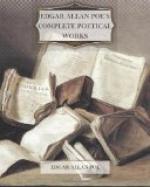Referring to the poet’s residence in Spring Gardens, Philadelphia, this writer says:
“It was during their stay there that Mrs. Poe, while singing one evening, ruptured a blood-vessel, and after that she suffered a hundred deaths. She could not bear the slightest exposure, and needed the utmost care; and all those conveniences as to apartment and surroundings which are so important in the case of an invalid were almost matters of life and death to her. And yet the room where she lay for weeks, hardly able to breathe, except as she was fanned, was a little narrow place, with the ceiling so low over the narrow bed that her head almost touched it. But no one dared to speak, Mr. Poe was so sensitive and irritable; ‘quick as steel and flint,’ said one who knew him in those days. And he would not allow a word about the danger of her dying: the mention of it drove him wild.”
Is it to be wondered at, should it not indeed be forgiven him, if, impelled by the anxieties and privations at home, the unfortunate poet, driven to the brink of madness, plunged still deeper into the Slough of Despond? Unable to provide for the pressing necessities of his beloved wife, the distracted man
“would steal out of the house at night, and go off and wander about the street for hours, proud, heartsick, despairing, not knowing which way to turn, or what to do, while Mrs. Clemm would endure the anxiety at home as long as she could, and then start off in search of him.”
During his calmer moments Poe exerted all his efforts to proceed with his literary labors. He continued to contribute to ‘Graham’s Magazine,’ the proprietor of which periodical remained his friend to the end of his life, and also to some other leading publications of Philadelphia and New York. A suggestion having been made to him by N. P. Willis, of the latter city, he determined to once more wander back to it, as he found it impossible to live upon his literary earnings where he was.
Accordingly, about the middle of 1845, Poe removed to New York, and shortly afterwards was engaged by Willis and his partner Morris as sub-editor on the ‘Evening Mirror’. He was, says Willis,




